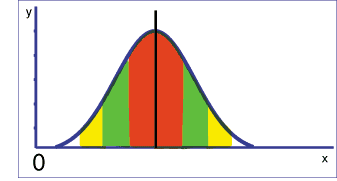by Jeff VanWickler
 The progressive utopia envisions a world where everyone, give or take, brings home the same money. Everyone is provided, more or less, with the same level of housing. There is no 1% and there are no poor. The exception of course being for movie stars, athletes (from non-violent sports), and handsome liberal politicians.
The progressive utopia envisions a world where everyone, give or take, brings home the same money. Everyone is provided, more or less, with the same level of housing. There is no 1% and there are no poor. The exception of course being for movie stars, athletes (from non-violent sports), and handsome liberal politicians.
The problem is that people are different from one another. Some have drive and some are lazy. Some are genius and some not so much. And most are somewhere in between. So, if people are left to their own devices, and we were to illustrate that in a graph, we would get something that looks like a bell curve.

Like progressives, some teachers don’t like the bell curve. As a result we sometimes see grade inflation but it is usually aimed at only one side of the graph – the side representing bad students.1 In this case, the better students don’t mind so much. An ‘F’ being generously graded as a ‘D’ seems like a charitable act. But progressives go one step further. They don’t care for the other side of the curve either. And if the ‘A’ students had to agree to accept a ‘B’ in order for their classmates to be elevated, we would encounter a problem.
Tocqueville noted: “Democracy and socialism have nothing in common but one word, equality. But notice the difference: while democracy seeks equality in liberty, socialism seeks equality in restraint and servitude.” In other words, in order to flatten out the curve, to make things equal, government must either prevent you from doing what you would choose or force you to do something you would not. Oh, I don’t know, maybe like having to buy health insurance.
So, is equality bad? No, force is bad. The two greatest examples pitting liberty against restraint and servitude are found today in North and South Korea and last century’s East and West Germany. Two homogeneous societies divided by political ideology. Only on the liberty side of those divides does one find wealth. And less sameness. There isn’t a more stark illustration of what is wrong with political diktat.
An aside—Here, the progressive protests that; what we want is not East Germany. We want socialism-light. To which, Hayek would say: that is the first step on the Road to Serfdom. And it is. Governments and bureaucracies never shrink. Their natural progression is towards the Leviathan state. And if it’s not reigned in you might one day see something crazy, like maybe a country of 300 million people amassing a 19 trillion dollar debt.
So, how about a sameness current event?
The New York Times reports: President Obama on Friday moved to require companies to report to the federal government what they pay employees by race, gender and ethnicity, part of his push to crack down on firms that pay women less for doing the same work as men. [full article]
However, like the students in the classroom, men and women are also not alike. For various reasons, and most I think relating to child rearing, some women choose fewer or more flexible hours than men. In exchange, they agree to earn less for performing the same job.
Mr. Obama plans to use executive power (again) to mandate companies with 100 employees or more to report salary information by gender and to submit it annually to the federal government.
If, as National Review points out, the Equal Employment Opportunity Commission (as they will be wont to do) interprets lower salaries for women as evidence of discrimination, employers might stop offering such arrangements and move to a one-size-fits all approach to satisfy the government requirements. Well, what other choice would they possibly have? And what about the women who prefer the flexibilty? Well now they have sameness!2
So I ask, to what extent do we want de facto equality?
Not too long after the wall fell, I drove my wife’s cousin back to his home in (former) East Germany from Bavaria. Crossing the border then, we left a bright and cheery modern western society for a dystopian looking countryside reminiscent of the film 1984. First the guard towers. Then towns devoid of color. One worn gray building after another. A town and a road on our map that had disappeared. In place, an abandoned strip-mine that once supplied brown coal. Broken down two-stroke East German cars on the sides of roadways. Some streets in such disrepair that we drove at pedestrian speed.
Gloomy, yes. However, aside from the government officials who got some nice perks, they had achieved something remarkably close to sameness…
Footnotes:
1Yes, “bad.” “Under performing” and other PC terms refer to a student anywhere on the graph.
2Just wait until sameness meets the Selective Service System.






